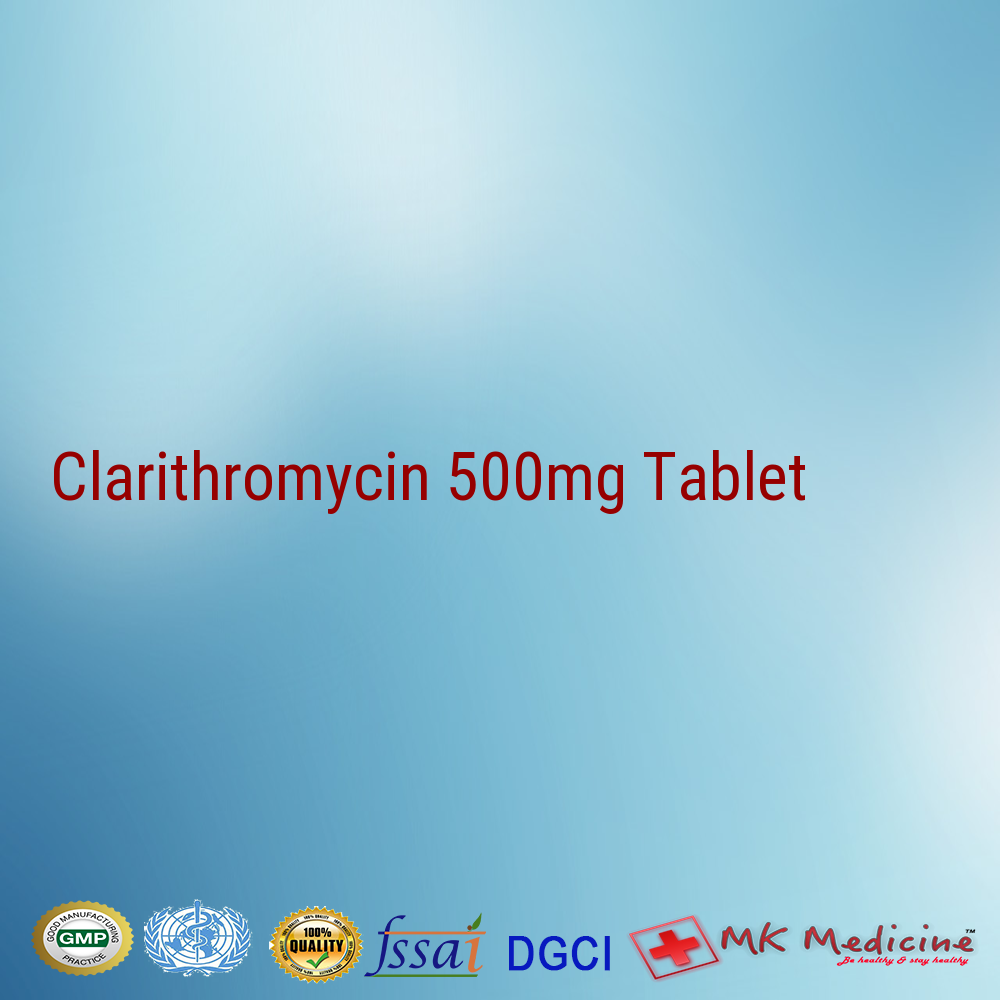Clarithromycin is used to treat a wide variety of bacterial infections. This medication can also be used in combination with anti-ulcer medications to treat certain types of stomach ulcers. It may also be used to prevent certain bacterial infections. Clarithromycin is known as a macrolide antibiotic. It works by stopping the growth of bacteria.This antibiotic treats only bacterial infections. It will not work for viral infections (such as common cold, flu). Unnecessary use or misuse of any antibiotic can lead to its decreased effectiveness
MK Medicine is a leading pcd franchise provider, contract manufacturer and hospital supplier of WHO-GMP certified Clarithromycin 500mg Tablet
Diarrhea, nausea, vomiting, headache, and changes in taste may occur. If any of these effects persist or worsen, tell your doctor or pharmacist promptly. Remember that your doctor has prescribed this medication because he or she has judged that the benefit to you is greater than the risk of side effects. Many people using this medication do not have serious side effects. Tell your doctor right away if you have any serious side effects, including: hearing loss, mental/mood changes, muscle weakness, eye problems (such as drooping eyelids, blurred vision), slurred speech, persistent nausea/vomiting, severe stomach/abdominal pain, dark urine, yellowing of eyes or skin. This medication may rarely cause a severe intestinal condition (Clostridium difficile-associated diarrhea) due to a type of resistant bacteria. This condition may occur during treatment or weeks to months after treatment has stopped. Tell your doctor right away if you develop: persistent diarrhea, abdominal or stomach pain/cramping, blood/mucus in your stool. Do not use anti-diarrhea products or narcotic pain medications if you have any of these symptoms because these products may make them worse. Use of this medication for prolonged or repeated periods may result in oral thrush or a new yeast infection. Contact your doctor if you notice white patches in your mouth, a change in vaginal discharge, or other new symptoms. Get medical help right away if you have any very serious side effects, including: severe dizziness, fainting, fast/irregular heartbeat. A very serious allergic reaction to this drug is rare. However, get medical help right away if you notice any symptoms of a serious allergic reaction, including: fever that doesn‚t go away, new or worsening lymph node swelling, rash, itching/swelling (especially of the face/tongue/throat), severe dizziness, trouble breathing. This is not a complete list of possible side effects. If you notice other effects not listed above, contact your doctor or pharmacist.
Before taking clarithromycin, tell your doctor or pharmacist if you are allergic to it; or to other macrolide antibiotics (such as erythromycin, azithromycin); or if you have any other allergies. This product may contain inactive ingredients, which can cause allergic reactions or other problems. Talk to your pharmacist for more details. Before using this medication, tell your doctor or pharmacist your medical history, especially of: liver disease (including liver problems with past clarithromycin use), kidney disease, heart disease (coronary artery disease, heart attack), a certain type of muscle disease (myasthenia gravis). Clarithromycin may cause a condition that affects the heart rhythm (QT prolongation). QT prolongation can rarely cause serious (rarely fatal) fast/irregular heartbeat and other symptoms (such as severe dizziness, fainting) that need medical attention right away. The risk of QT prolongation may be increased if you have certain medical conditions or are taking other drugs that may cause QT prolongation. Before using clarithromycin, tell your doctor or pharmacist of all the drugs you take and if you have any of the following conditions: certain heart problems (heart failure, slow heartbeat, QT prolongation in the EKG), family history of certain heart problems (QT prolongation in the EKG, sudden cardiac death). Low levels of potassium or magnesium in the blood may also increase your risk of QT prolongation. This risk may increase if you use certain drugs (such as diuretics/"water pills") or if you have conditions such as severe sweating, diarrhea, or vomiting. Talk to your doctor about using clarithromycin safely. Clarithromycin may cause live bacterial vaccines (such as typhoid vaccine) to not work as well. Do not have any immunizations/vaccinations while using this medication unless your doctor tells you to. Before having surgery, tell your doctor or dentist about all the products you use (including prescription drugs, nonprescription drugs, and herbal products). Older adults may be more sensitive to the side effects of this drug, especially hearing loss and QT prolongation (see above). During pregnancy, this medication should be used only when clearly needed. Discuss the risks and benefits with your doctor. This medication passes into breast milk. Consult your doctor before breast-feeding.
Important Notice:- The Database is still under development and may contain inaccuracies. It is not intended as a substitute for the expertise and judgement of your physician, pharmacist or other healthcare professional. It should not be construed to indicate that the use of any medication in any country is safe, appropriate or effective for you. Consult with your healthcare professional before taking any medication.


Amoxicillin IP 500mg Clavulanic Acid IP 125mg Tablet